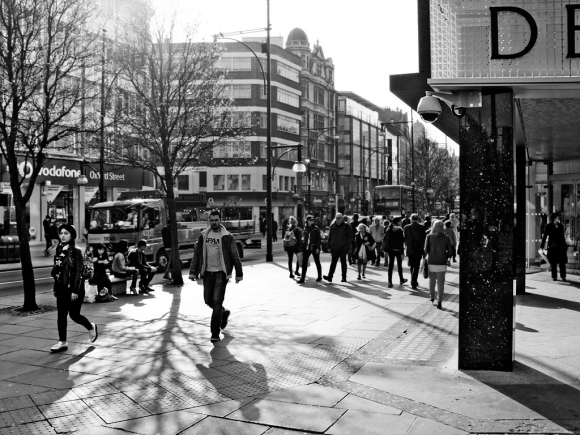Stephanie Tennant stood in Selfridges among the rails of trousers and blouses in white and orange and yellow, and impossible jackets in mauve and black and red. She walked through to the cosmetics department, stumbled, and almost fell. As she did so, a sales assistant, seizing the opportunity, took a step towards her and held out a small bottle of fragrance. It was all money now, money and greed. Stephanie stood, marooned beneath the glittering lights, all about her the bright mirrored decor and heavy clamour of perfume.
A Japanese girl said: “Would madam like me to make-up your face? We’re doing a special January promotion.”
Stephanie had never been late for work before. She had made the same journey every working day for nine years, taking the 8.04 from Barnes to Waterloo and then the Northern Line to Tottenham Court Road, from where she walked the short distance to the second-floor offices in Oxford Street. This morning her employees at Argus Secretarial Script Services would be surprised when they saw her. There were three of them: the ever-reliable Nita, pregnant Pam, and Mel, the breath of fresh air, the life and soul of the party.
“Pluck my eyebrows,” Stephanie told the girl. “Get rid of them.”
She rummaged in her bag for cigarettes; then, remembering that smoking was not permitted, put them back. Her bag was always tidy. Mel’s, on the other hand, was always a mess. Stephanie had seen her trying to find a lost earring, pulling everything out onto her desk: old tissues, loose change, Tampax, brushes, mascara, lipsticks, sellotape, door keys, half-empty bottles of Evian. That had been the Friday before Christmas.
Stephanie’s husband, Michael, came in on Fridays, in the afternoons, to do the books. Michael was an accountant. Whenever he called in, he would always to talk to the girls. He knew Stephanie disapproved. Aware of her standing in the doorway of her small side office, he would grind his teeth, and his tiny fists would clench and unclench.
“I mustn’t keep you from your duties, ladies,” he would say cheerily.
He’d walk to the door, stop by Mel’s desk, tap his pipe on the heel of his right shoe, and knock the burnt tobacco into her yellow waste-paper bin.
“Oh, thanks!” Mel would exclaim in mock delight.
“You never do that in my bin!” Nita and Pam would protest.
It had become the office joke. A ritual.
The Japanese girl held up a mirror.
“More red,” Stephanie ordered, “more black round the eyes.”
Some weeks before Christmas, the lease had come up for renewal, the landlords had doubled the rent, and Stephanie had found herself standing at the window of her office, looking down into Oxford Street at the Americans, the Japanese, the Arabs, the Nigerians, the procession of Hari Krishnas with their bells and drums and chanting, their shaven heads, their lunatic appearance. She had watched and listened to the traffic. Everyone on the move, going places. She had noted the buses, the number 10 to and from Hammersmith, the number 25 back and forth from Ilford, the 73 out to Stoke Newington and the 390 to King’s Cross and Archway.
“Would madam like to buy the face cream?” the assistant asked. “The eye shadow, the blush, the lipstick?” These were cut-throat days. The girl wrapped each item individually and placed it in a fancy white box and tied each box at the top with a pink ribbon. She put the boxes into a pink-and-white plastic carrier bag. She handed the bag to Stephanie, and Stephanie took it away with her.
“Close crop it,” Stephanie told the young stylist at Gielly Green in George Street. “Short,” she snapped, “then dye it red.” The stylist lifted her hair and let it fall. This was the hair that Michael had nearly torn out by its roots on New Year’s Eve. He had pulled her head down level with his and punched her in the face.
“You want to make me unhappy?” she had asked him.
“I do!”
He had kicked her into the bedroom then and left her curled up in a corner, with the man next door banging on the wall.
Before they had married, Michael would have roses and champagne delivered. He had shown her off to his friends and colleagues. But poor bloody infertile Stephanie had failed him, after which the beatings began. She’d told him she wanted a divorce, and he had come up with the Argus idea. It had been a peace offering. The business would belong to her. He would finance it. He knew about finance.
Stephanie stood on the corner of Gloucester Place, her face, her hair transformed, waving at taxis that wouldn’t stop. On the pavement beside her was the pink-and-white carrier bag containing the cosmetics. The girls would be wondering where she’d got to. She was going to deliver a bombshell that morning. She would stun them into silence with her announcement that Argus was closing. She’d already bought their goodbye presents. There was a watch for Nita, as she had broken hers. There were baby clothes for Pam. And for Mel, who had always fervently declared her loyalty to Stephanie and the business, there was a small red box in the shape of a heart. In it there was an earring which Mel had complained of having lost, and which Stephanie had found in Michael’s trouser pocket on New Year’s Eve.
A taxi pulled over to the kerb where she stood. The cabby looked out at her. Then, almost immediately, he drove on.


